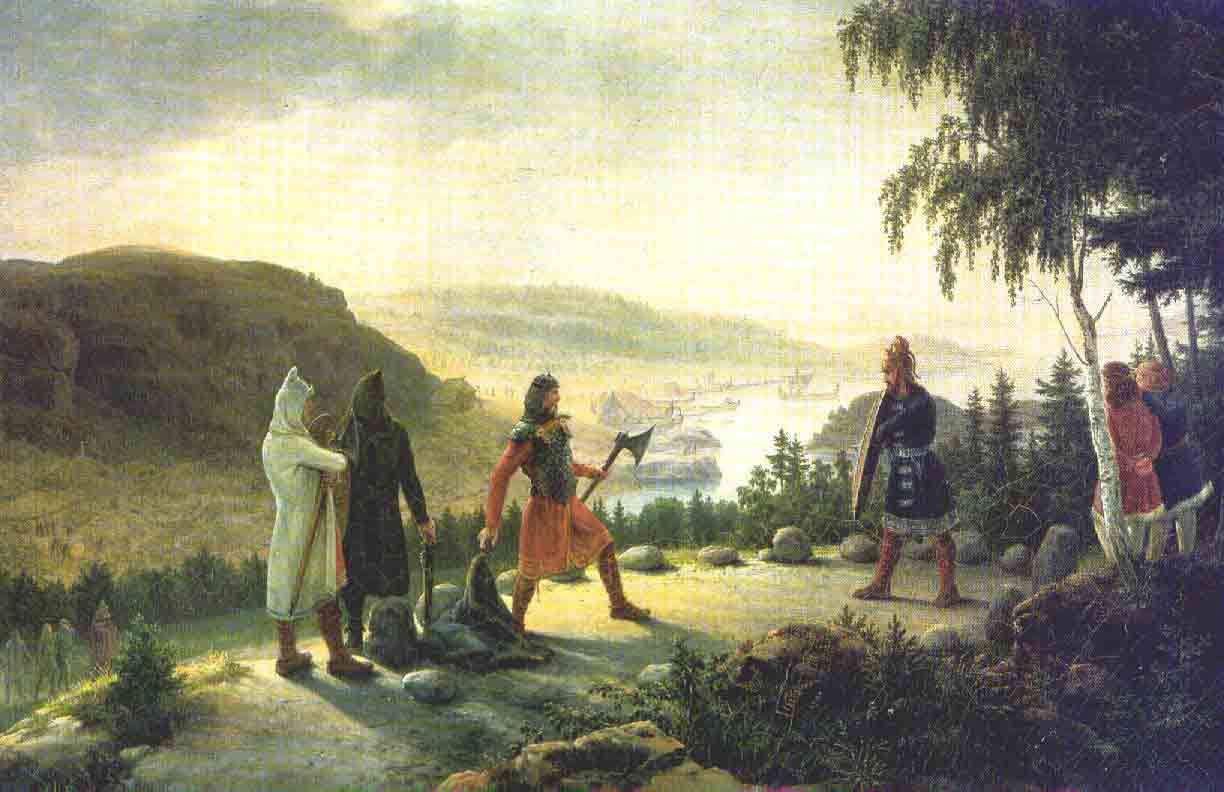Egill Skallagrimsson was an Icelandic poet and warrior who lived in the 10th century. He is the protagonist of the Egil’s Saga, a long, expansive tale which appears to have been written in the 13th century, but which likely has some historic basis despite its temporal separation from the life of its main character.
In chapter 63 of the Saga, Egill has led a life that included quite a bit of fighting, and by now has included an extended feud with Eirik Bloodaxe, the Viking king of York on the island of Britain, not yet a united Kingdom. In the earlier stages of this feud in Norway, Egill an uncommonly large, strong, and skilled warrior, had killed Eirik’s son, two of Eirik’s wife’s brothers, a retainer, and attempted to curse Eirik’s family.
Upon being shipwrecked near Eirik’s lands, Egill found himself near the home of his enemies. Rather than try to hide from a family which had great power, he took advantage of the fact that Viking law forbade killing at night, and composed a poem in Eirik’s honor, in the hope that by praising Eirik and helping to spread his renown, he might be allowed to live. Upon hearing it, the king was impressed by the poem and let Egill live. The poet went on to fight in more battles, and eventually retired to Iceland.
I’ve shared an older translation that I think carries the weight of the situation a bit better, but you may want to try a more recent translation that’s a bit cleaner and easier to understand.

From Egil’s Saga ch. 63, translated by W.C. Green, 1893
HEAD-RANSOM
1.
‘Westward I sailed the wave,
Within me Odin gave
The sea of song I bear
(So ’tis my wont to fare):
I launched my floating oak
When loosening ice-floes broke,
My mind a galleon fraught
With load of minstrel thought.
2.
‘A prince doth hold me guest,
Praise be his due confess’d:
Of Odin’s mead let draught
In England now be quaff’d.
Laud bear I to the king,
Loudly his honour sing;
Silence I crave around,
My song of praise is found.
3.
‘Sire, mark the tale I tell,
Such heed beseems thee well;
Better I chaunt my strain,
If stillness hush’d I gain.
The monarch’s wars in word
Widely have peoples heard,
But Odin saw alone
Bodies before him strown.
4.
‘Swell’d of swords the sound
Smiting bucklers round,
Fiercely waxed the fray,
Forward the king made way.
Struck the ear (while blood
Streamed from glaives in flood)
Iron hailstorm’s song,
Heavy, loud and long.
5.
‘Lances, a woven fence,
Well-ordered bristle dense;
On royal ships in line
Exulting spearmen shine.
Soon dark with bloody stain
Seethed there an angry main,
With war-fleet’s thundering sound,
With wounds and din around.
6.
‘Of men many a rank
Mid showering darts sank:
Glory and fame
Gat Eric’s name.
7.
‘More may yet be told,
An men silence hold:
Further feats and glory,
Fame hath noised in story.
Warriors’ wounds were rife,
Where the chief waged strife;
Shivered swords with stroke
On blue shield-rims broke.
8.
‘Breast-plates ringing crashed,
Burning helm-fire flashed,
Biting point of glaive
Bloody wound did grave.
Odin’s oaks (they say)
In that iron-play
Baldric’s crystal blade
Bowed and prostrate laid.
9.
‘Spears crossing dashed,
Sword-edges clashed:
Glory and fame
Gat Eric’s name.
10.
‘Red blade the king did wield,
Ravens flocked o’er the field.
Dripping spears flew madly,
Darts with aim full deadly.
Scotland’s scourge let feed
Wolf, the Ogress’ steed:
For erne of downtrod dead
Dainty meal was spread.
11.
‘Soared battle-cranes
O’er corse-strown lanes,
Found flesh-fowl’s bill
Of blood its fill.
While deep the wound
He delves, around
Grim raven’s beak
Blood-fountains break.
12.
‘Axe furnished feast
For Ogress’ beast:
Eric on the wave
To wolves flesh-banquet gave.
13.
‘Javelins flying sped,
Peace affrighted fled;
Bows were bent amain,
Wolves were battle-fain:
Spears in shivers split,
Sword-teeth keenly bit;
Archers’ strings loud sang,
Arrows forward sprang.
14.
‘He back his buckler flings
From arm beset with rings,
Sword-play-stirrer good,
Spiller of foemen’s blood.
Waxing everywhere
(Witness true I bear),
East o’er billows came
Eric’s sounding name.
15.
‘Bent the king his yew,
Bees wound-bearing flew:
Eric on the wave
To wolves flesh-banquet gave.
16.
‘Yet to make more plain
I to men were fain
High-soul’d mood of king,
But must swiftly sing.
Weapons when he takes,
The battle-goddess wakes,
On ships’ shielded side
Streams the battle-tide.
17.
‘Gems from wrist he gives,
Glittering armlets rives:
Lavish ring-despiser
Loves not hoarding miser.
Frodi’s flour of gold
Gladdens rovers bold;
Prince bestoweth scorning
Pebbles hand-adorning.
18.
‘Foemen might not stand
For his deathful brand;
Yew-bow loudly sang,
Sword-blades meeting rang.
Lances aye were cast,
Still he the land held fast,
Proud Eric prince renowned;
And praise his feats hath crowned.
19.
‘Monarch, at thy will
Judge my minstrel skill:
Silence thus to find
Sweetly cheered my mind.
Moved my mouth with word
From my heart’s ground stirred,
Draught of Odin’s wave
Due to warrior brave.
20.
‘Silence I have broken,
A sovereign’s glory spoken:
Words I knew well-fitting
Warrior-council sitting.
Praise from heart I bring,
Praise to honoured king:
Plain I sang and clear
Song that all could hear.’
